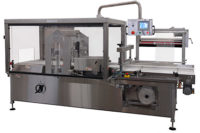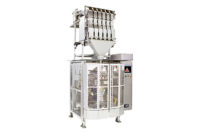HUMAN RESOURCES
Actions• As of 2005, all McCain Foods USA facilities became tobacco-free. McCain offers an annual “tobacco-free” incentive of $600 for employees to participate in a smoking cessation program. It also offers $250 reimbursement for any employee or family member trying to quit smoking. This can be used to cover costs of treatment aids.
• A “McCain in Motion” fitness program includes an ongoing walking competition with individuals and facility-specific groups tracking their accumulated mileage. McCain also provides reimbursements and discounted memberships to area nutrition programs (such as Weight Watchers) and local gyms.
• Employees may reduce their medical plan premium costs by up to $400 each year, either by having an annual physical or taking an on-site health risk assessment check-up. At some locations, McCain also provides health coaches to employees who voluntarily ask for assistance with lifestyle changes, improvements.
Achievements
• McCain’s PPO medical plan insurance premiums remained at 2005 rates through all of 2007.
• Since 2005, McCain has experienced a 6 percent reduction in the number of employees who smoke, bringing the overall average down to 26 percent.
• In 2006, 82 percent of McCain employees voluntarily took annual physicals or participated in on-site health risk assessments. Thirty percent took part in the company’s “McCain-in-Motion” fitness program.
Says Eileen O’Shea, director of employee benefits:“We’re proud of how our [tobacco cessation and health awareness] incentive programs have helped influence the health and lives of employees and their families. . . . This says something about our culture. Other benefits people ask me, ‘How do you [get corporate buy-in to] implement these programs?’ Yet from the very beginning, we’ve done this because it’s the right thing to do. There’s absolutely no question about investing in our employees. We’ll continue to do this.”
EMPLOYEE SAFETY
Actions• All plants follow an in-house “Key Elements of Safety” (KES) plan with nine programs detailing management involvement and support, employee involvement, safe policies and procedures, safe practices (standard operating procedures), planning for safe conditions (inspections), employee training, behavior observation, failure analysis and feedback, and performance measurement and tracking.
• McCain developed a Safety Performance Index (SPI) of “leading” indicators, which incorporates all activities in the nine-point KES program. SPI measures safety-related improvements, behavior observation reports and safety recognition efforts.
• McCain created a corporate National Safety Manager post to coordinate companywide safety issues, programs and opportunities.
Achievements
• All 10 McCain Foods USA factories have earned “Gold” certification in the American Institute of Baking’s integrated quality and safety program. Recipients must demonstrate superior performance in a GMP audit qualification, HACCP validation and verification, and a quality systems evaluation.
• Although the government’s total incident rate (TIR) average involving frozen fruit and vegetable plants is more than 8.0, McCain’s 10 U.S. operations exceeded their combined total plant goal rate of 4.22 and actually came in at 3.75 during fiscal 2007. McCain’s fiscal 2008 goal (for the year ending June 2008) has been set at a TIR of 3.0 and through the first five months of the fiscal year, operations delivered a sparkling TIR performance of 2.78 companywide.
Says John Steddick, senior director of employee relations:“The senior leadership team at McCain is committed to our becoming a world-class safety organization. That’s been discussed by Dale Morrison, our global CEO and reinforced by Frank van Schaayk, our U.S. chief executive. Today, safety is the first thing addressed in every business – globally. Again, our commitment is to become world class, which we’re defining with a TIR of 1 or less.”
ENVIRONMENTAL MANAGEMENT
Actions• McCain established environmental key performance indicators in all food processing plants for water consumption, energy utilization (electricity, fossil fuels, renewables), waste materials and recycled materials. It also tracks and measures raw material utilization, air impacts, landfill disposal, wastewater discharge permit compliance and environmental incidents.
• McCain implemented energy reduction programs from field to factory. These range from installation of variable speed fans in potato storage buildings to installation of heat recovery systems from various processing operations.
• The company led McCain Foods’ worldwide “Environmental Agenda for Agriculture” whereby sister units in all countries quantify total pesticide, fertilizer and irrigation water use and set annual reduction targets. McCain requested that all its U.S. farmer suppliers adhere to the USDA Good Agricultural Practices program.
Achievements
• All factories “significantly” reduced water consumption, total energy utilization and fossil fuel utilization with corresponding increase of renewable energy utilization. Also, it reduced CO2 air emissions and total waste, including landfill waste.
• All McCain Foods potato factories and farms passed USDA farm food safety audits, in addition to customer environmental sustainability audits.
Says Doug Hahn, director of environmental engineering: “Retail and foodservice customers are repeatedly stating that environmental sustainability is ‘the defining issue of our time.’ They are requesting information and tracking of raw material utilization, disposal and impacts on the environment. Their goal, ultimately, is to reduce the environmental footprint of the products they purchase. Several key customers are performing environmental audits to assess our sustainability practices. They are expecting us to show year-over-year improvement on environmental impacts.”


